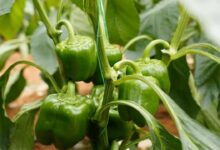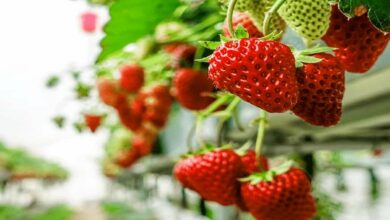This woman from Kerala earns lakhs of rupees per month by cultivating soilless dragon fruit
Success Story: Remabhai S. Sreedharan, who was born in Kollam, Kerala, spent 36 years of her life as a teacher, finally becoming the headmistress of her institution. One of the worst times in her life came when she retired in 2022—her mother, who was 95 years old, passed away. Given the importance of her mother in her life, the loss was great. Remabhai made the decision to fully immerse herself in agriculture—a profession that had always piqued her interest—in order to deal with her loss and find a new purpose.
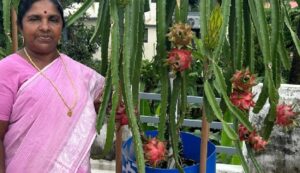
The Hunt for an Unusual Crop
Remabhai started along the path of study, full of ambition to achieve something worthwhile. Motivated by her conviction that the import of these unusual fruits from other nations was having a detrimental effect on Kerala’s economy, she spent two to three months studying exotic fruits. Finding a crop that could be effectively grown locally would lessen reliance on imports, which was her aim. She conducted research on more than forty exotic fruits, such as oranges, mangoes, kiwis, and apples. Still, she was particularly intrigued by the dragon fruit.
Remabhai says, “Dragon fruit is not just a fruit; it’s medicinal.” The fruit stood out for its several health advantages, which included a high antioxidant content, beta-carotene for better vision, and vitamin D for healthy bones and teeth. The fact that dragon fruit had substantial medical benefits in contrast to the other fruits she had researched was what finally persuaded her. Inspired by this finding, she made the decision to devote her life to the production of dragon fruit.
Adopted the method of creative farming
Remabhai had a major obstacle to overcome despite her passion: the amount of land she could grow was restricted. Nine out of the thirteen cents she owned—one cent is equivalent to 0.01 acre—were occupied by her home, leaving only four cents available for farming. This restriction did not stop her, however. She utilized three novel cultivation techniques: soil-less cultivation, the less soil-more plants approach, and the classic way because she was determined to cultivate dragon fruit on a huge scale.
Remabhai put 90 concrete poles, each holding four dragon fruit trees, on her little 4 cent allotment. A typical acre of land could only support around 500 dragon fruit plants, but Remabhai’s technique enabled her to grow 400 plants on a little bit of space. Her methodology is efficient: “This method allows more plants to grow in less soil,” she says.
Farming on the roof
Remabhai looked to her terrace as she ran out of room on the ground. Her son opposed to the notion of transporting dirt onto the terrace, even though she intended to extend her dragon fruit garden there. Remabhai, who never gives up lightly, made the decision to try soilless agriculture. She carefully watched as she put one stem in soil and another in compost. The stem in the compost grew quicker and healthier, much to her joy.
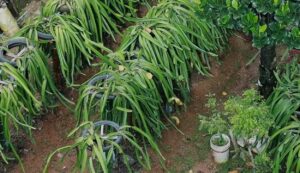
Inspired by her achievement, she went to Aluva, Kerala, and bought fifty chemical barrels, which she lifted onto her balcony using a pulley system. She packed the barrels full of her own compost, which was a mixture of dried and green leaves, rice husks, dust from stem cuttings, and either cow dung or chicken manure. There were two dragon fruit seeds in each barrel. After six months, she was bestowed with an abundant crop: thirty dragon fruits from a single barrel, or a total of fifteen hundred dragon fruits. Each fruit weighed around 600 grams, and some even reached 810 grams.
Exchange of Innovation and Knowledge
Remabhai was motivated to impart her expertise to others by her achievement. She started “JC’s World,” a YouTube channel where she shared her agricultural discoveries and methods. People were eager to obtain knowledge from her experiences; thus, her channel rapidly became well-known. Among her noteworthy inventions is the “mother culture,” a microbial solution that quickens the breakdown of leaves. She also invented a mixed fishamino that is rich in over 90 micronutrients and is produced from tiny prawns, crabs, and other fish species. She also created an efficient microbial (EM) solution.
She proudly states, “I get calls for advice from people all over India.” Another of Remabhai’s inventions is her green organic solution, which is created by soaking weeds and green leaves in water. She utilizes this nitrogen-rich fluid as fertilizer; it was inspired by a method her father used in his rice fields.
Honours and Achievement
Remabhai’s creative thinking and diligence have paid off nicely. She now makes between Rs. 30,000 and Rs. 40,000 from the plants she grows on her 4-cent plot and around Rs. 40,000 from the dragon fruit she grows on her terrace. Her income is further increased by her one-acre dragon fruit farm, which enables her to make around Rs. 1.5 lakh a month.
Remabhai finds great satisfaction in her profession, even with the physical challenges of running her farm—especially since that her son lives distant and her husband has resumed work after retirement. The blossoms open at roughly nine o’clock at night. They make me feel so happy,” she says. She finds great satisfaction in the sight of the dragon fruit blooms, which bloom in the moonlight.
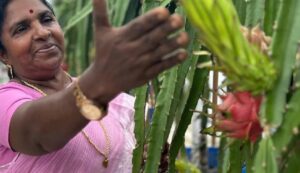
Remabhai’s commitment to organic farming has also resulted in an exceptionally high production; most farmers only get two harvests of dragon fruit each month, while Remabhai receives three. She says, “It’s all because of the organic methods I use.” The dragon fruit season usually lasts from May to November, but Remabhai has been able to harvest her fruit until December and even earlier in 2024—in March.
Broadening Perspectives
Remabhai is always experimenting with other crops in addition to dragon fruit. She is now farming sapota, Pakistani mulberries, and Bhutanese mangoes for her personal use. In addition, she raises jackfruits in pots; in her own compost, approximately 300–400 jackfruit plants are flourishing.
Appreciation and Honors
Remabhai began her agricultural career only two years ago, yet in that time she has won numerous important accolades in recognition of her accomplishments. She was given the Gram Panchayat’s Best Organic Farmer Award in 2023 by MLA G.S. Jayala. She received two more honors in 2024: one from the Samudra Charitable Trust and another from Kerala’s Minister of Animal Husbandry, J. Chinchu Rani, for Best Organic Farmer.
Significant Message For Fellow Farmers
Remabhai has a simple yet significant message for fellow farmers: “Agriculture is not a loss.” Use organic farming practices and make sensible crop selections; these approaches are inexpensive and sustainable. Her transformation from a depressed retiree to a prosperous organic farmer is proof of the strength of resiliency, creativity, and a strong connection with the earth. Her phone number is 93499 37641.
